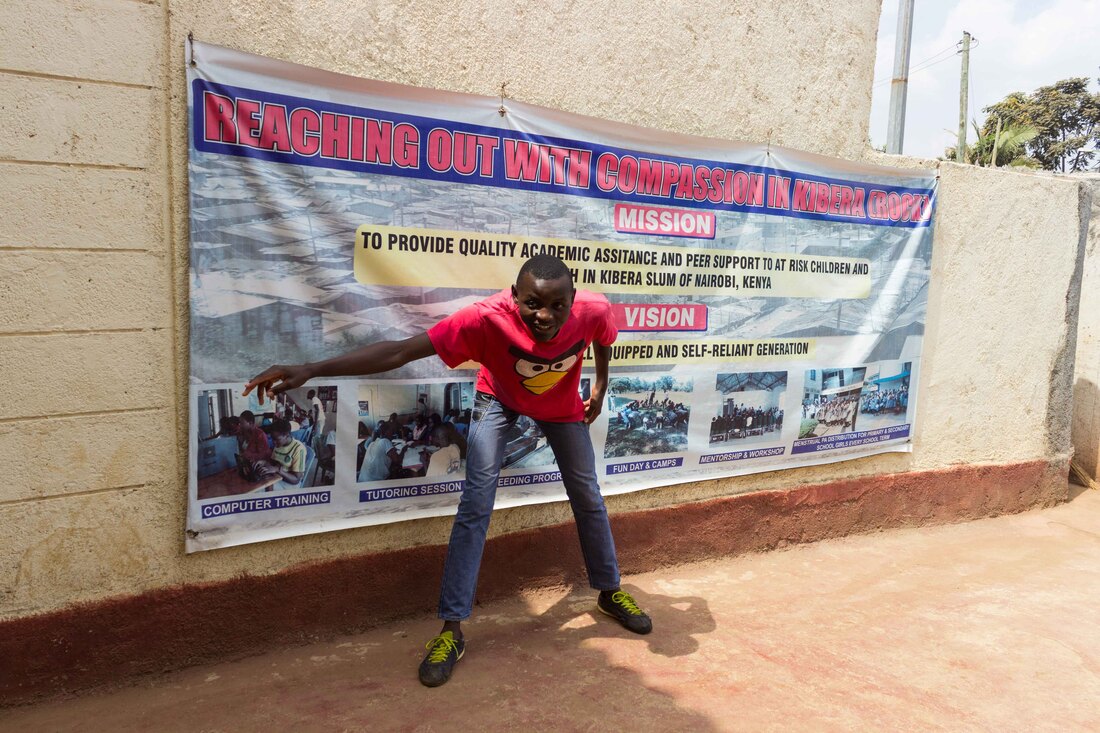RECA | RE-TUNING CINEMA IN AFRICA
|
Reaching Out With Compassion in Kibera (ROCK) helps kids in Kibera access learning material & provides a space where they can learn & interact with each other. It also provides kids with scholarships & connects them to mentorship opportunities. RECA Cinema Club & ROCK held a week-long workshop from 20th August to 24th August about the art of film-making with teenagers taught by different facilitators. They were taught the basics of script-writing, how a producer guides the project, using sound to create emotions & using the camera as a tool in storytelling. Teenagers learnt how to tell stories effectively and the importance of teamwork in film-making. Essential skills needed to train the next generation of Kenyan filmmakers telling African stories. Finally, all the teenagers came together to create a podcast discussing 'Life in Kibera As A Teenager. It was an eye-opening experience as they all came together to share their hopes, fears & aspirations about Kibera. Kibera is a place with a lot of talent & potential to make an impact. The Podcast is coming soon! If you'd like to be a part of the RECA Cinema Club meets ROCK. Kindly contact us at +254708708547 or email us at [email protected]. RECA Cinema Club is dedicated to nurturing future filmmakers, so contact us, if you'd love to start up a Film Club in your high school. “Education is a once in a lifetime opportunity to open children’s hearts and minds to the unbelievable wonder of the universe.” – Sir Anthony Seldon RECA would like thank ROCK for hosting us at Olympic Estate, Kibera.
1 Comment
 The Kenyan film industry can be referred to as Riverwood, taken from River Road. River Road is known for supplying everything & anything under the sun. Others use the term Machawood, to refer to the film industry because it’s free to film in Machakos County. A massive win for Kenyan filmmakers. The film industry has great untapped potential, but it’s hindered by political & economic challenges. Finding money to support high-quality Kenyan films is hard. It doesn’t enough support from the government to support itself plus other key players that have the funding. Also, the film sector doesn’t offer enough incentives to sweeten the deal for filmmakers. In comparison, in South Africa, filmmakers are given tax rebate of up to 25% to shoot their films there. So if they fulfill required guidelines to shoot in South Africa, then, they get a percentage of their money back, plus they get the chance to support black-owned businesses. Furthermore, tight regulations enforced by KFCB under Ezekiel Mutua make it hard for creatives to push the limit whilst creating content. As an illustration, Rafiki by Wanuri Kahiu was given rave reviews at the Cannes Festival, yet it was only available in Kenyan cinemas for a week after Kahiu went to court. The film industry isn't seen as a serious employer, generating wealth & job opportunities. Monetizing Kenyan films is hard since we have less than 20 movie screens in the country. These screens show movies from Hollywood, hence securing a screening for a Kenyan movie takes time & patience. Further, not many filmmakers are aware of the importance of marketing & distribution of their movies. Still, within Kenya, we have many filmmakers that are pursuing their passion & a talented workforce that can be hired by foreign production crews. Kenya has several colleges & universities that teach students the art of filmmaking. After completing school, they, then gain exposure & work experience within the industry. Kenyan filmmakers have released films such as Malooned, Dangerous Affair, Nairobi Half-Life, Kati Kati, From a Whisper, Supa Modo, 18 Hours and others that have left a mark on Kenyan cinema. Kenyan films are accessible on subscription-based streaming sites. RECA can help connect your dream of shooting in Kenya with Kenyan filmmakers that have expertly honed in on their craft. |
LindaFilmmaker ArchivesCategories |

 RSS Feed
RSS Feed